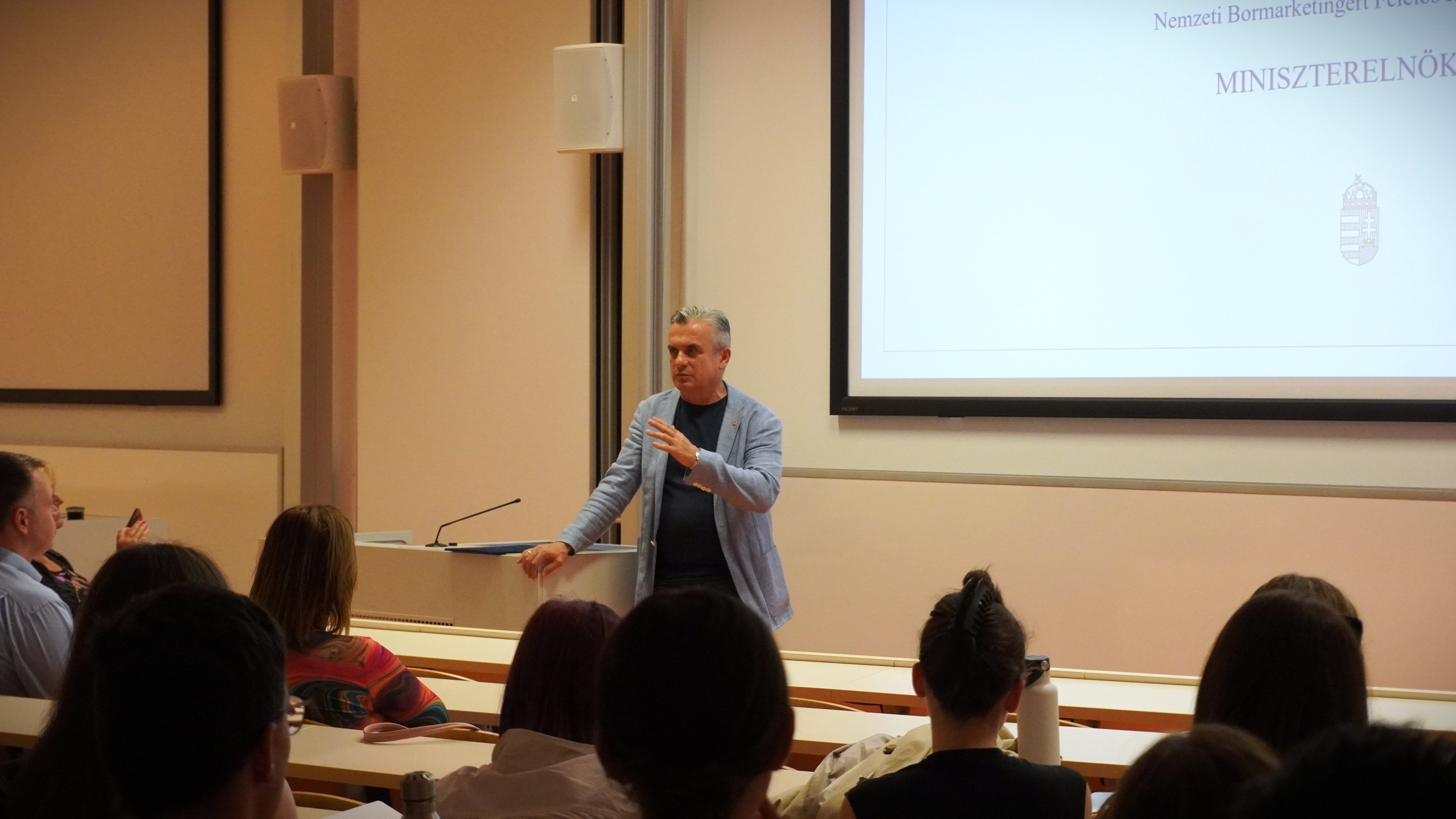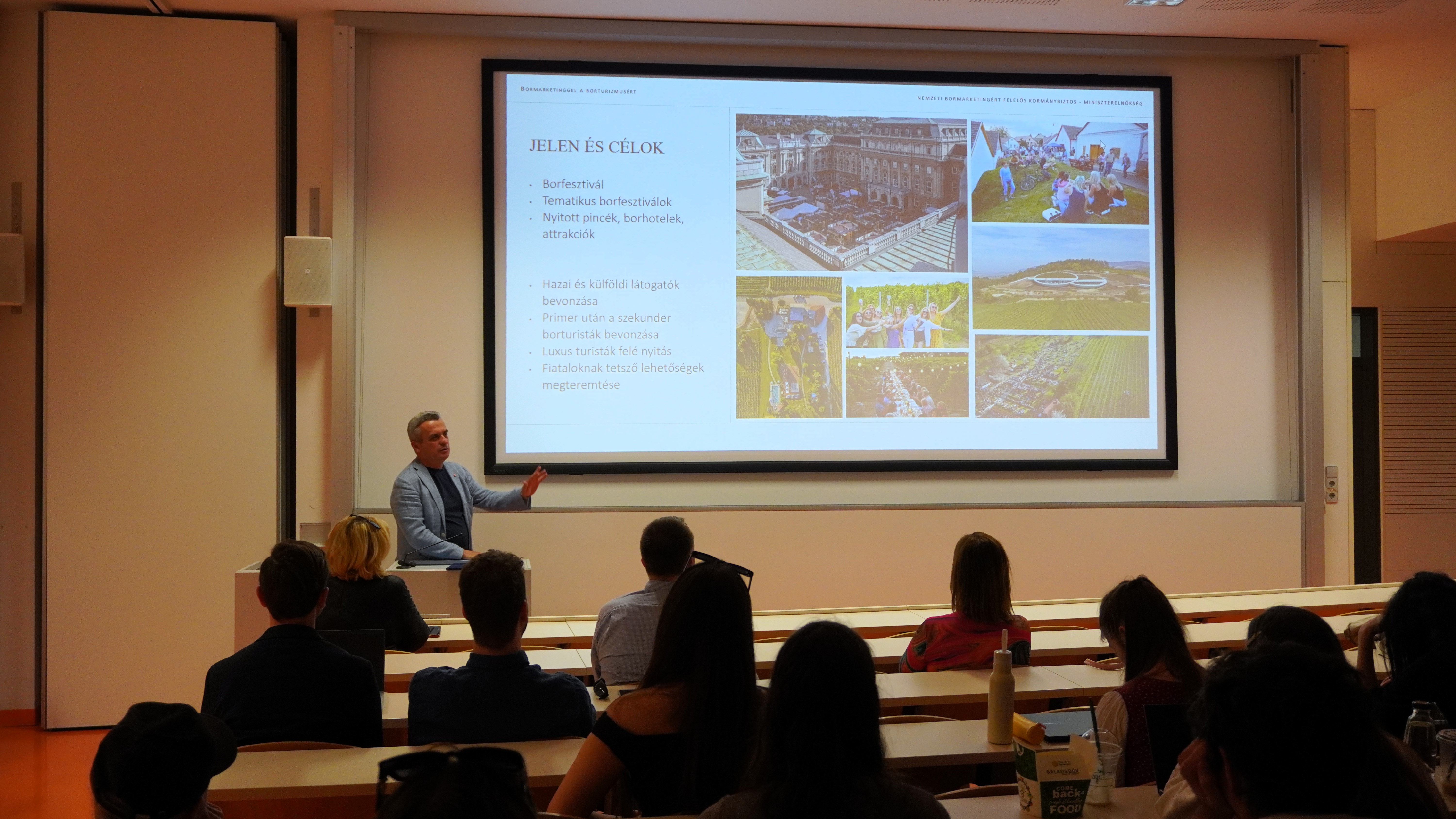The truth lies in wine – in the Hungarian ones lies hope

Author: Izrael Gréta
Cover photo: Tóth Valter
Corvinus University’s Mobility and Tourism Research Centre organized a presentation as part of their Tourism Forum event series, through which Pál Rókusfalvy had the chance to share his experience, plans and already implemented programs connected to wine. His name might sound familiar to a lot of people since he is a prominent figure of the Hungarian wine-marketing, thanks to whom Etyek became the most important vineyard of Budapest.
Although nowadays we mostly mention Rókusfalvy when talking about wine, there was a time when he was active in doing radio, teaching, and even in music. At the beginning he only looked at wine as an object of investment, but as time went by wine business became his true passion and later also his profession. His career started off from a vineyard in Etyek and later started to make the town’s tourist attractions and programs more popular. He even opened a restaurant, since guests were very hungry after all those acidic wines, so it came in handy that they had a place where they could ease their hunger. Based on the interest in it, he started organizing picnics. The goal was to give the “vine-close experience”, because wine consumption is not about the quantity, but more about the quality.
As he got deeper and deeper into the artifice of winery, he was able to see what this field is lacking. According to what he said in the past 30 years the Hungarian wine market dwindled. Many thought that Hungarian wines can be sold only because of their reputation and they don’t need to be dealt with. While in other countries at universities, in tourism and when dealing with Foreign Affairs wine market is an important matter, in Hungary this branch of marketing didn’t get the attention it needed. This could be one of the reasons why Hungarian wine didn’t get international recognition. This is unfortunate, because these wines hold very serious potential in themselves. Our country is a wine empire that is built on effusive rocks, which are rare, and therefore could be a great buzzword to be used when talking about it on the market. Despite these opportunities nowadays the products are imported as bulk wine, which significantly decreases their true value.
Image: Tóth Valter
In addition to all this, it would be important to target younger generations, since even though wine consumption is a true vitality amongst members of Hungarian society, winery still counts as an outdated branch. The reason for that could be that young people see less and less pleasure and opportunity in wine and wine making, vineyards and the hard work that comes with its nursing is hovering in front of their eyes instead. For them a glass of domestic wine doesn’t provide as much experience, as much hassle is involved in its making. According to Rókusfalvy, with the right framing this part of society could also be formed in their opinion. We rarely see wine-drinking youths at events, because they favor the consumption of different cocktails and shots. However, with the right wine-based cocktail recipes, wine consumption could be promoted amongst them too. On the webpage of Bor.hu a bunch of events can be found, all connected to wine, so that everyone interested, regardless of their age can find the program they like. Moreover, on this page, besides the work of domestic winemakers, the description of characteristics of different wine regions can be seen, because
“every glass of wine includes the scenery, where it was made and the human, who thanks to arduous work has created it.”
Innovation, education, communication, sustainability, research, market research and digitalization. These seven key words serve as the basis of the wine marketing represented by Rókusfalvy. Even amongst these, education deserves a special place, which was the motive and goal of this event as well, that was organized by Melinda Jászberényi, associate professor and Head of Centre. Keeping these policies in mind, Hungarian wine can get the chance to rise up to the worldwide standards.
“Even though wine is just one of many alcoholic drinks, it still has a crucial role in our culture.”
We don’t have to go too long back in time to recognize for how long this drink serves as a part of Hungarian national identity. In fact, the wine region in Tokaj is named the number one wine region in the world, and the tokaji aszú made from the vine nursed there is a treasure of ours that is known worldwide. Even the pope used this wine to give his blessings to the work of the god-fearing winemakers. Wine consumption in Hungarian society is not only a gastronomic curiosity, but also a foundation of their existence and it’s only up to us, whether 10 years from now people will think of Hungary as the home of wine or the country where once in the past delicious wine was made.
